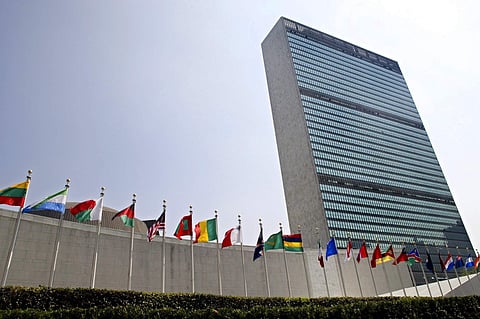

UNITED NATIONS: Acts of rape and murder "dehumanise societies" and letting the perpetrators of such crimes go unpunished is a "warning" sign for all, the head of UN's agency on women empowerment said, amid the outrage over Kathua and Unnao rape cases.
UN Under-Secretary-General and Executive Director of UN Women Phumzile Mlambo-Ngcuka said the statements by the UN Resident Coordinator in India and the "condemnation" by Prime Minister Narendra Modi of the gang rape and murder of an eight-year-old girl in Kathua district and a 17-year-old girl in Unnao are "important" but even more important is the "action that follows".
"To rape and kill children is to defy and violate fundamental aspects of our shared humanity. No rape and no murder is justifiable," Mlambo-Ngcuka said yesterday.
She said acts of rape and murder "dehumanise societies" in ways that are profoundly dangerous.
"If they go unchallenged and unpunished, they speak to a reduced value of human life and of an abdication of responsibility that are warning signs for us all," she said.
The senior UN official said families of both the victims have suffered losses and await justice.
There have been too many such atrocities and too often it is women and girls who are deliberately targeted, intentionally instilling fear and building divides, she said.
"Through recognition and change of the context that allows these attacks to occur, lies a vital path to broader action on gender equality, to tolerance of difference or belief, and an absolute end to impunity without exception for all those who transgress universal human rights," she said.
Mlambo-Ngcuka stressed that the assertion of the human rights of everyone, everywhere and their protection by the rule of law, is a fundamental tenet of the UN.
"It is most potent for those least able to claim their own rights and most needed by those who have least access to justice," she said.
UN Resident Coordinator in India Yuri Afanasiev had strongly condemned the gang rape and murder of the eight-year-old girl in Kathua district in Jammu and of the 17-year-old girl in Unnao, saying an "unequivocal commitment" by leadership at "the highest level" to address sexual violence and to ensure accountability for such crimes is essential for justice to be delivered.
"We are deeply concerned about the prevalence of gender-based violence, including sexual violence against women and girls, which we are witnessing in India," Afanasiev had said in an April 13 statement issued in New Delhi.
"We take note of the investigation and judicial processes that are now underway in the two cases and are hopeful that they will result in speedy justice for the girls and their families.
We also hope that their families and communities will be protected and their rights upheld," Afanasiev added.